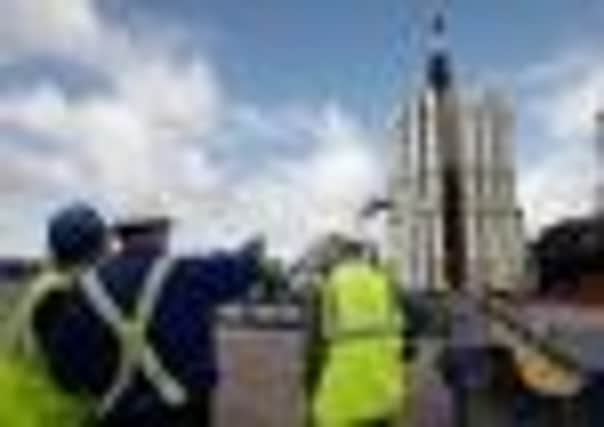Budget 2013: Fury over tax breaks for fracking


Chancellor George Osborne said “shale gas is part of the future and we will make it happen”, as he unveiled measures to support the industry, including field allowances to promote early investment.
A shorthand term for the method of extracting gas from shale rock by hydraulic fracturing, fracking involves drilling into rock and breaking it up with high-pressure liquid.
Advertisement
Hide AdAdvertisement
Hide AdLast month, a report from PricewaterhouseCoopers (PwC) said Scotland was sitting on up to £5 billion of untapped natural gas reserves, which could be extracted using the technique.
However, opponents are worried about the possibility of earthquakes and water pollution caused by fracking, while environmentalists have warned the growth of the industry will make it harder for the UK to meet goals to cut emissions and tackle climate change.
The technique was previously suspended in the UK after concern that it was responsible for two earthquakes in Lancashire.
But the moratorium has been lifted, with large parts of Scotland, such as Fife, Stirling and Aberdeenshire, viewed as ripe for exploration.
The Chancellor said proposals would be developed to ensure local communities would benefit from shale gas projects.
But Westminster will keep under review whether the largest projects could have the option to apply for the go-ahead through a central government process, rather than via local authorities.
Dr Tim Fox, head of energy and environment at the Institution of Mechanical Engineers, welcomed the Chancellor’s support for fracking, but said: “It is important for the government not to see shale gas as the silver bullet many claim it is.
“Shale gas is unlikely to impact greatly on energy prices in the UK, and we must avoid becoming hostage to volatile gas markets by not being over-reliant on gas.”
Advertisement
Hide AdAdvertisement
Hide AdFracking is credited with transforming the prospects for the United States energy industry, as the natural gas sector has collaborated with the government to improve drilling and extraction methods, reducing North America’s reliance on importing supplies.
Greenpeace energy campaigner Lawrence Carter said: “The Chancellor is slashing public services with one hand, while gifting tax breaks to the fossil fuel industry with the other.
“Bungs to the gas industry make it harder for Britain to meet its climate targets and stifle the low-carbon sector, which provided one-third of all UK growth between 2011-12.”
Friends of the Earth’s head of campaigns Andrew Pendleton added: “Shale gas is not the solution to rising energy bills – extraction will have an earth-shattering impact on local communities.”
The authors of last month’s PwC report said Aberdeen’s oil and gas sector “could secure a long-term future” by focusing more on fracking.
They insisted Scotland “grasp the nettle and both exploit and adapt its wealth” of offshore expertise to gain a share of a multi-billion-pound industry.
The report said the global shale oil market could generate 14 million barrels of oil a day by 2035, cutting the price of crude oil by 25-40 per cent.
A Scottish Government spokesman said: “Although there are plans for the development of coalbed methane in the Falkirk area, there are no plans being considered for hydraulic fracturing [fracking] in Scotland at this time.”
Peterhead in line for £1m carbon-capture bonanza
Advertisement
Hide AdAdvertisement
Hide AdA CARBON capture and storage project at Peterhead has been named one of two preferred bidders in a £1 billion UK-wide programme.
The project in Aberdeenshire and the White Rose project in Yorkshire will develop their proposals over the next two years before a final investment decision is made in 2015.
The technology could allow the safe removal and storage of harmful carbon emissions from coal-fired and gas-fired power stations and heavy industry, helping the UK meet its climate change targets.
Professor Lesley Sawers, chief executive of the Scottish Council for Development and Industry (SCDI), said: “The progression of Peterhead CCS project is a positive step in developing Scotland’s world-class potential in this area.”
WWF Scotland’s senior climate policy officer, Dr Sam Gardner, added: “It’s great news to hear that Petehead has made the final two in the government’s competition to win funding.
“Demonstrating carbon capture on this existing gas power station would enable us to test the technology and cut emissions from our energy sector, while we transition to a renewable future.”
The proposal for Peterhead involves capturing around 90 per cent of the carbon dioxide from the existing gas-fired power station, before transporting it and storing it in a depleted gasfield beneath the North Sea.